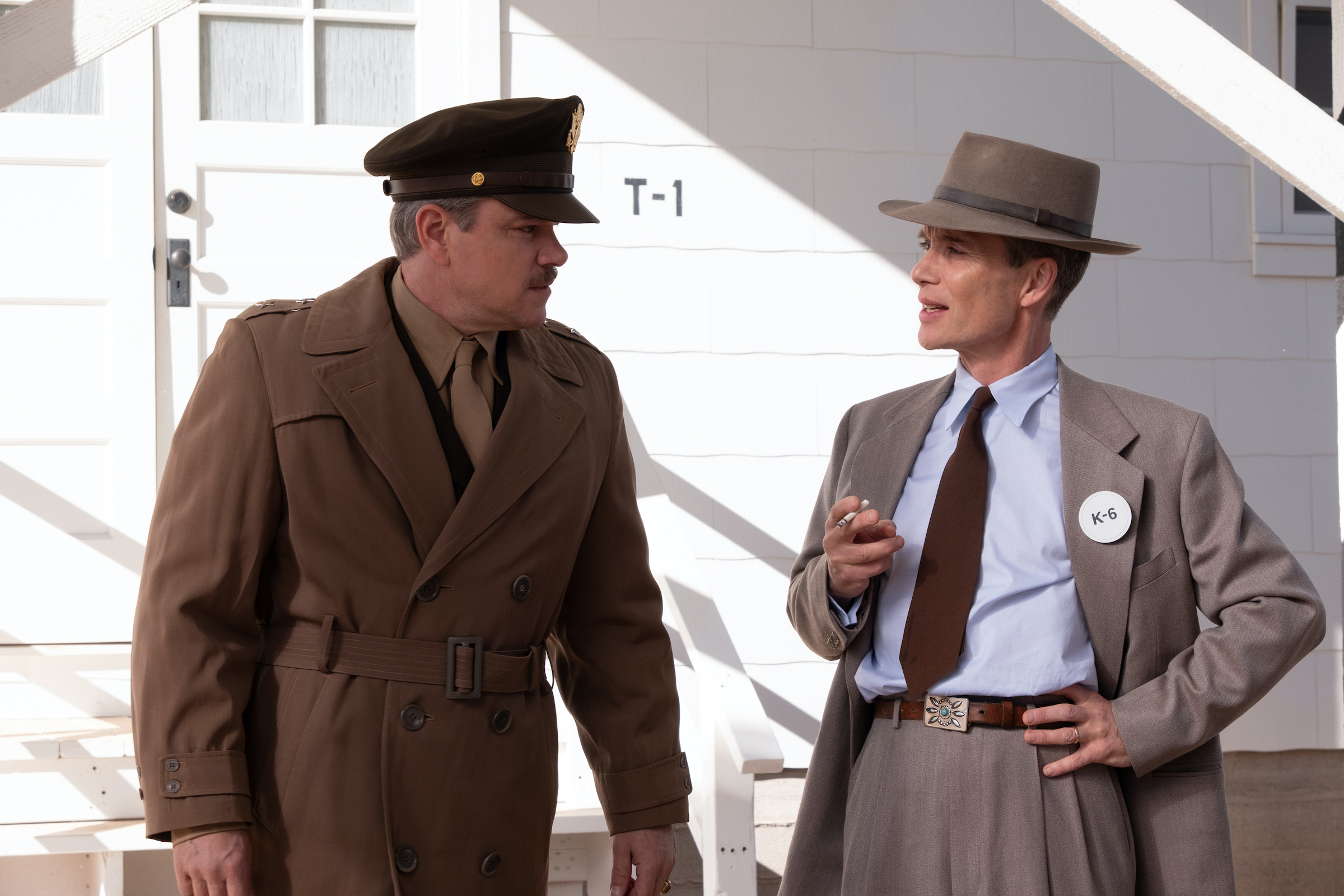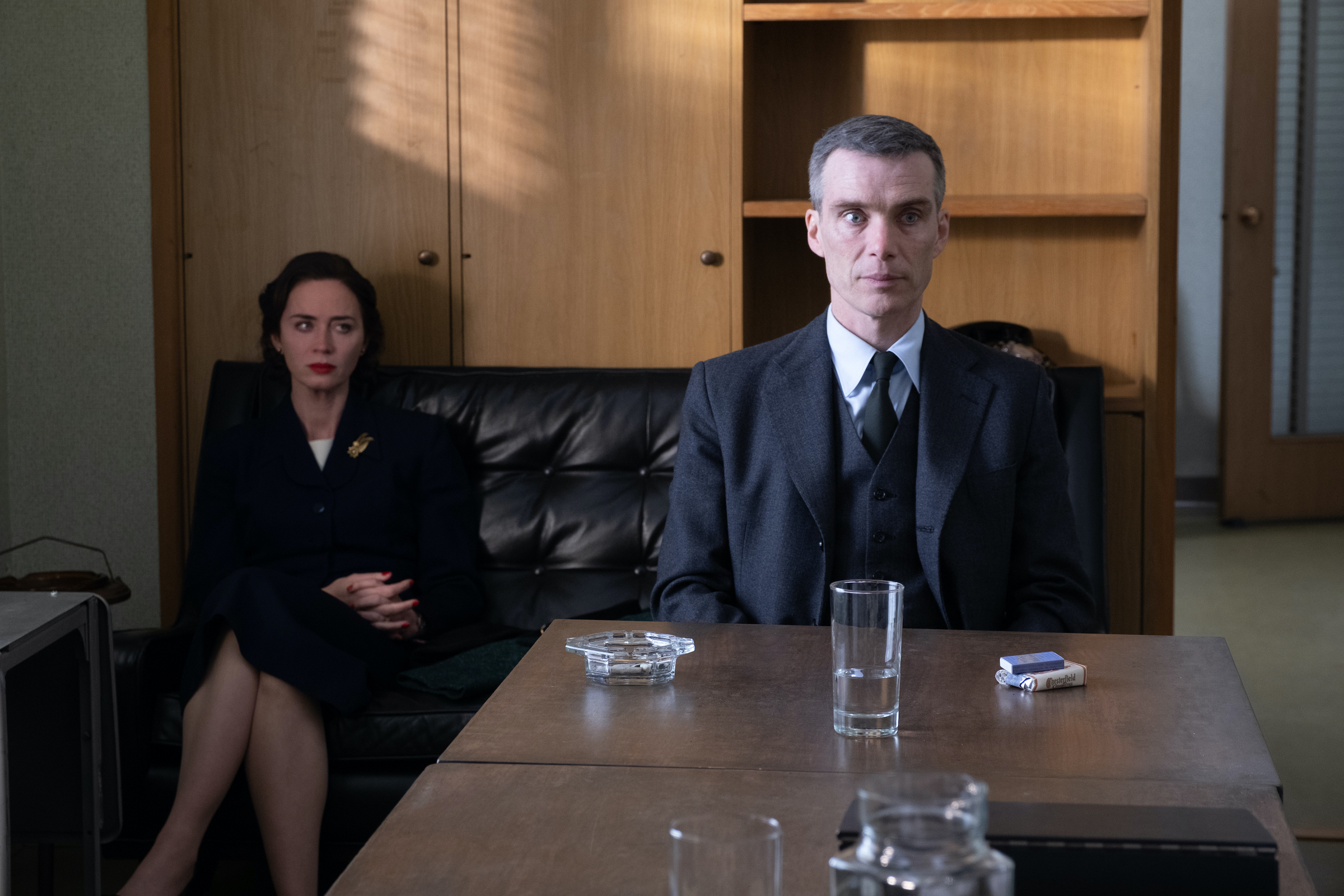In filmmaking there’s a fine line between elegance and pretension, and Christopher Nolan, a citizen of both nations, criss-crosses the border freely. His dedication to craft is always right there on the screen, even in films you may not like; for better or worse, you can usually feel the thought vibrations that went into his decisions about where to put the camera, or how to move the actors around. He knows his stuff, and he makes sure we know that he knows. His expertise gleams like a family crest, looking great when it’s discreetly stamped on a piece of silver, though you really wouldn’t want it on a beach towel.
There may be times in Oppenheimer when you look at the screen and think, Oh brother! as Nolan razzle-dazzles us with impressionistic inset shots of psychotically whirling stars and billowing plumes of what looks like molten lava, all while the lead character expounds in voiceover on the nature of matter, the universe, and other stuff. But either despite its intense craft or because of it, Oppenheimer works. In telling the story of genius theoretical physicist and atomic-bomb architect J. Robert Oppenheimer—played, with an almost otherworldly luminosity, by Cillian Murphy—Nolan blurs the distinction between grandeur and grandiosity. Both his subject and his lead actor can stand up to the outsize scale of his approach, so why shouldn’t he go for broke? So few filmmakers know how to make, or are able to make, pictures this big, about grown-up subjects. Nolan shapes Oppenheimer’s story into something like an epic poem, focusing not just on his most famous achievement, but on everything that happened to him afterward; Nolan is maybe even more interested in Oppenheimer as a complicated, questioning patriot.

As you know if you’ve seen even just one Nolan film—it could be Memento, or Interstellar—he likes to scramble the signals in his storytelling. Oppenheimer is a story told in dots and dashes, demanding that you keep up with its shifts in time and space. But even if you know nothing about Oppenheimer’s story, following along is not that hard—Nolan pulls it all together at the end, and from that vantage point, the landscape of where he’s taken us looks pretty grand. We get some background on Oppenheimer’s time as a young student at Cambridge, homesick for America (he was born in New York) and tormented, as he tells us in those voiceovers, by the secrets of an “alien universe.” (Here’s where those visions of blasting stars and looping ribbons of light, accompanied by jarring, staticky noises, come in.) An early encounter with one of his heroes, Danish physicist Niels Bohr (a half-jaunty, half-regal Kenneth Branagh), recalibrates his thinking. He goes to museums, stares at paintings by Braque and Picasso, and something clicks. The music of the universe begins to make more sense. Oppenheimer begins to think and feel more furiously. There’s some writing on a chalkboard—in scientist movies, there always is—but Nolan uses the conceit sparingly and with some delicacy. He knows, as we do, that the scritch of chalk is a lot more romantic than the squeak of a Dry Erase marker.
Nolan toggles between the distant past and the less-distant past, shifting between black-and-white film stock to muted color as he focuses on three central episodes in Oppenheimer’s story. (The movie’s source is Kai Bird and Martin J. Sherwin’s 2006 biography American Prometheus: The Triumph and Tragedy of J. Robert Oppenheimer.) One of these is the 1954 hearing that ultimately led to the revocation of Oppenheimer’s security clearance, ending his career in government and eroding his status as an academic. Jason Clarke’s Roger Robb oversees the proceedings, wearing a carved-stone face that’s decided “guilty” long before he’s even heard any of Oppenheimer’s own testimony, or that of his witnesses.

The problem was that after Oppenheimer had pulled off the achievement, both extraordinary and tragic, of developing the bomb that would end World War II, his government, which no longer really needed him, decided it was time to question his loyalty—though the FBI had already been dogging him for years, collecting possible evidence against him. After the bombing of Hiroshima and Nagasaki, Oppenheimer had also expressed moral qualms about the horrors that he’d helped unleash upon the world, and worried about the misuse of nuclear weapons in the future. Nolan balances that 1954 security hearing with another set of hearings before the Senate, convened to confirm—or not, as it turned out—Lewis Strauss (Robert Downey Jr.), a founding member of the Atomic Energy Commission, to the position of Secretary of Commerce under Dwight D. Eisenhower. Downey’s performance, equal parts subtly scented aftershave and snake oil, is a double-dealing marvel.
By now, you may have figured that there a lot of men swirling around Oppenheimer, and we haven’t even gotten to the sections of the movie set in Los Alamos, where Oppenheimer led a team of scientists in the top-secret activities of the Manhattan Project. (They’re played by actors including, but not limited to, Benny Safdie, David Krumholtz, and Josh Harnett, plus the sole woman, Olivia Thirlby.) When they test their super-duper bomb in the desert, they put on little goggles and avert their eyes during the blast—their self-protective measures are both comical and horrifying.
Sign up for Worth Your Time for weekly recommendations on what to read, watch, and listen to.
There’s a lot going on in Oppenheimer, and it can leave your brain a little scrambled. But Nolan never loses sight of Oppenheimer the man. We get a sense of Oppenheimer’s early adjacency to the Communist Party (though he never officially joined), another convenient strike against him during that 1954 hearing. There’s also a grievous and, for Oppenheimer, heartbreaking affair with a 1930s cool-girl party member, Jean Tatlock (Florence Pugh)—the love scenes between the two involve some tastefully lit but not-unaffecting nudity, as well as the reading of Sanskrit. (Always interesting to imagine how great scientists do it.)

Nolan is working with so many moving parts here that it would be logical to wonder: does Murphy, his star, even get enough screen time? But Nolan ensures that the movie belongs to him. It’s a wonderful performance, somber without being deadening, and ultimately haunting. What’s it like to be married to a hot genius? (One of the accusations often flung at Oppenheimer was that he was a “womanizer,” though that word has differing meanings depending on who’s applying them, and how.) Emily Blunt gives us a sense of that in her portrayal of Oppenheimer’s wife, Kitty, also the mother of his two children. There’s no single scene that brings this complex and not particularly blissful marriage to life; it’s only late in the film, when Oppenheimer asserts that these two have “walked through fire” together, that you get a sense of the ironclad bond between them. Murphy doesn’t play Oppenheimer as the distracted-genius husband; it’s more that he accepts that his life must unfold on numerous shifting planes, each distinct from but affecting the others. You can’t apply quantum mechanics to human behavior.
Most important of all, Nolan doesn’t disguise or downplay his sympathy for Oppenheimer the man and the scientist. In that sense, his movie is bracingly honest. He also doesn’t try to oversimplify Oppenheimer’s crises of conscience—they were anything but simple, as Nolan and Murphy show in several scenes underscoring the fact that World War II had to end sooner rather than later, to save the lives of both American and Japanese troops—the casualties on both sides were mounting astronomically day by day and week by week. Yet how could anyone involved in the creation of that bomb not question his or her role after the fact, especially with the benefit of hindsight? Murphy, like Oppenheimer, has a frame that looks to be built from matchsticks, almost too fragile-seeming to support that big brain on top. And his skin has a papery, translucent quality; there are moments when you feel you can almost see his nerve endings quivering beneath. That’s acting for the big screen. And it’s what a great actor can do when a filmmaker hands him a very big story, played out on a canvas designed for great leaps of imagination.
More Must-Reads from TIME
- Donald Trump Is TIME's 2024 Person of the Year
- Why We Chose Trump as Person of the Year
- Is Intermittent Fasting Good or Bad for You?
- The 100 Must-Read Books of 2024
- The 20 Best Christmas TV Episodes
- Column: If Optimism Feels Ridiculous Now, Try Hope
- The Future of Climate Action Is Trade Policy
- Merle Bombardieri Is Helping People Make the Baby Decision
Contact us at letters@time.com